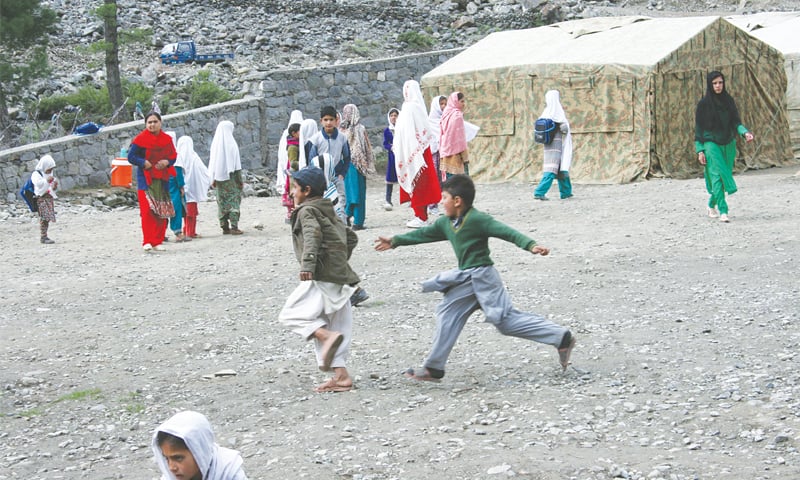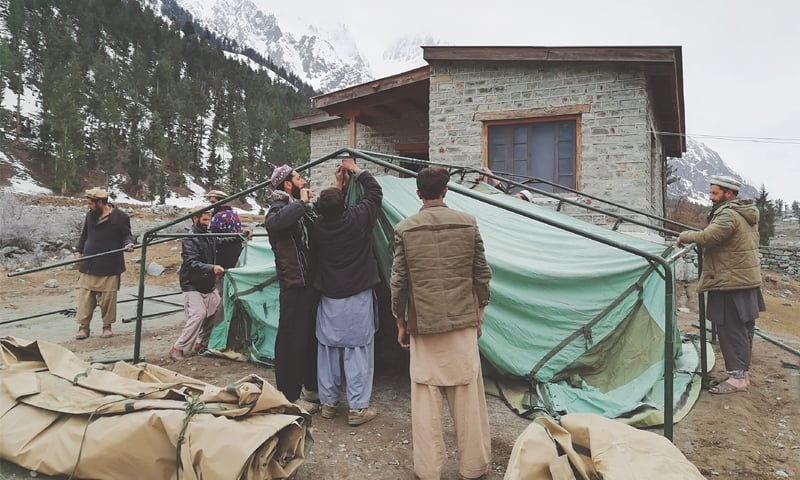Travelling first by Daewoo from Lahore to Rawalpindi, then by air to Gilgit and finally in a jeep over 40 kilometres of a road somewhat half metalled, followed by a daredevil last few kilometres over a boulder and rocky river bed, to the final hour-long lap of sprinting up steep hills and down inclining dales, Tehseen Sufi could only stare wide-eyed at the scene in front of her. “Here I was, expecting some sort of a ramshackle spread of bedraggled kids rote learning the alphabets but what do I see?” she says.
Sufi, with 40 years of experience in the field of education and now academic consultant to the project, was witness not just to a school, but the microcosm of an entire valley, changed all over by the sheer devotion and determination of a husband and wife team.
Each year, Zahid and Shahnur Farooq spend nine months away from family and friends, subsisting on little else but potatoes for food, like the poeple of the valley. “But this is home,” says Shahnur, the de facto principal, teacher-trainer, class mentor and social motivator and psychological evaluator at Parha Likha Pakistan School. Her husband, Zahid, chips in, “Four years down the road, our family works like a behind-the-lines armour brigade mustering material and support for the project.”
Devoted and determinded, a husband-and-wife team has built a remarkable primary school in Naltar valley
Neither of them formally trained for the job, Shahnur and Zahid (now retired from the Pakistan Air Force) run a state-of-the-art primary school for the children of the community living within a distance of 40 kilometres around Naltar Bala — a tiny settlement nestled in the middle of nowhere around the mountains north of Gilgit. In just three years of formal operation, the school has 300-plus children between the ages of four to 15 years lined up for morning assemblies, squatting on rush matting in two brick-built and tent classrooms, learning lessons and craft, or playing in the open. Shahnur’s pet project is to prepare a group of 14-year-old girls from the first enrolment to sit for the seventh grade public examinations this year.

For the Farooqs, the love affair with Naltar goes back at least two-and-a-half decades when Zahid was assigned the charge of the PAF base ski-training setup for the local children. “They were good players and we even went to the Vancouver Olympics but, academically, they were at ground zero. They badly needed to be groomed into mainstream activities,” he says.

Five years ago, Zahid managed to gather three groups of 10 volunteers and brought them to Naltar that summer. For three months, the volunteers went on to supplement the local schools’ staff. Working 12 hours daily at an average, they brought about a sea change. But then trouble started brewing as the local teachers felt sidelined and began to create hurdles. The schoolchildren began questioning their teaching methodologies.

Determined not to cow down to resistance, the Farooqs persuaded an imam of the local mosque to give them space where they worked in the afternoons, along with a couple of volunteers. Even in those austere conditions, 93 children enrolled. “We gave them three-in-one booklets and used a makeshift blackboard, but it was the amazing community feedback that kept us going.” This support led to the discovery of an abandoned basic health unit building.
Zahid coaxed the authorities concerned to let him use the two rooms of the unit.

And so the Farooqs put together the school, piece by piece. Sometimes it was a water cooler — filled with water from the stream nearby — sometimes it was a rush matting, sometimes it was a school bell, and sometimes window-panes or a coat of whitewash. “We would enrol just about any child willing to come in and Shahnur’s home-designed syllabus did the rest. Our daughter arranged a steady flow of volunteers from the plains, who were duly screened and tested.”

Shahnur painstakingly instilled hygiene awareness in the children some of whom had never seen a bar of soap. “But they are all highly motivated children. Our volunteer psychologist told us they are keen to learn because they have never before been exposed to this side of life. Neither had their parents.”

The Farooqs’ winning streak is their sensitivity to local customs, such as granting an impromptu holiday when the kids wanted to go potato harvesting — one of the biggest annual festivals held in the area.
Shutting down for winter break on December 15, the Farooqs were on a new high. In their home base, Islamabad, they drew up a syllabus, and were assured of state-of-the-art Montessori equipment and sufficient funds to hire teachers at competitive salaries.

Back in Naltar after the break, the new school year drew in 134 enrolments along with a new set of challenges. “The headmasters of the local schools — alarmed at the dropout rates in their own schools — mounted a campaign to make us quit,” says Zahid. “They would come visiting to see how we were faring. That year, a lot of children went away from us under pressure.” But Shahnur and Zahid persevered.

This April they opened with a total of 54 enrolments in Montessori (the seats were filled up in just two hours on a first-come-first-serve basis), with 17 teachers and consultants flying in periodically.
The Parha Likha Trust School at Naltar has its own stringent academic regulations: no more than 16 children to a class. The logic is encouraging, as Zahid talks of ambitious plans of sending his wards for further studies at public schools in the plains. “We want our children to be able to compete with the best.” The teachers, too, are all set to be trained at the Fazaia Teachers’ Training Institute in Islamabad, as of this year.
Meanwhile, come snow, rain or shine, Shahnur and Zahid do a daily one-hour sprint up the hills, crossing a rocky river bed — often changing routes in case of a landslide — to reach their wards who cheerily greet them in.
Published in Dawn, EOS, August 19th, 2018














































Dear visitor, the comments section is undergoing an overhaul and will return soon.